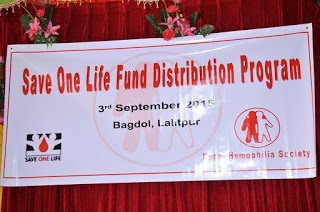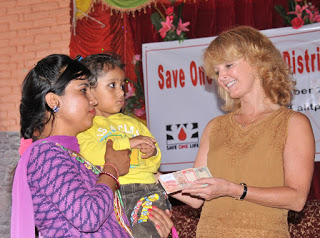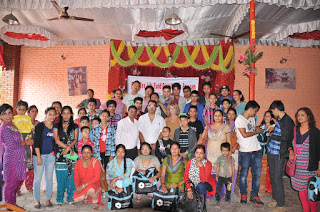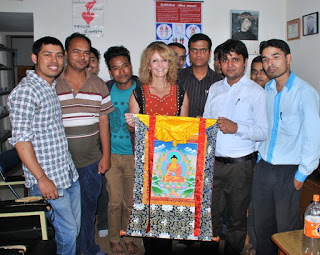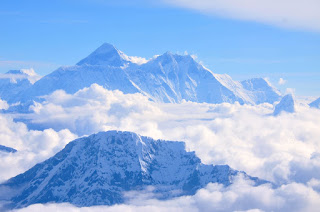1,123
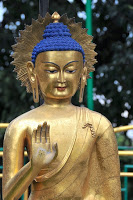 Was it the
Was it thealtitude? At 4,430 feet, being in Kathmandu, Nepal is like being in Denver. It’s enough to slow you
down and dehydrate you if you are not accustomed to it. But I thought just do it. Go to see the famed “Monkey Temple.” Wednesday, September 2, was my day off.
I took a taxi over very bumpy, twisting roads where vehicles darted madly around us like metal dragonflies. Cars and motorbikes come
within inches of one another and somehow avoid accidents. The driver offered to
stay and wait an hour, which is all that it took. I recall being here in 1999, but with the April 25 earthquake, this World Heritage Site is in shock. The earthquake caused extensive damage to the temples and buildings. Dusty red bricks were piled up, or avalanched down stairs. Temples had huge cracks
in them, with plaster curling off them. Rhesus monkeys scooted up the sides of the
temples and into the doorways to steal the food offering left by pilgrims. Incense
mixed with acrid odors. And above it all, the eyes of Buddha stare down placidly and eternally from the highest temple.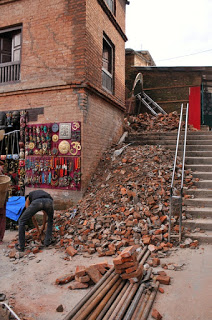

within inches of one another and somehow avoid accidents. The driver offered to
stay and wait an hour, which is all that it took. I recall being here in 1999, but with the April 25 earthquake, this World Heritage Site is in shock. The earthquake caused extensive damage to the temples and buildings. Dusty red bricks were piled up, or avalanched down stairs. Temples had huge cracks
in them, with plaster curling off them. Rhesus monkeys scooted up the sides of the
temples and into the doorways to steal the food offering left by pilgrims. Incense
mixed with acrid odors. And above it all, the eyes of Buddha stare down placidly and eternally from the highest temple.

Thursday September 3, 2015
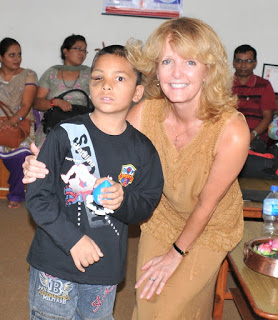 Today I met
Today I metwith the beneficiaries of Save One Life and presented their money to them. The families were waiting for me and Laxmi, and I
smiled and waved at them when I entered, being casual so they would feel comfortable. Many
smiled back. The logistics were wonderful: a beautiful small stage,
bedecked in red; a big sign announcing Save One Life Fund Distribution. So many
young boys and older boys and families showed up.
We finally got settled, and the
ceremony began; there were many speeches and welcomes. I recall
Beda, man with hemophilia and president of the Nepal Hemophilia Society, said to the audience, “Pain and hemophilia are synonymous.” And then, “My mother used to
weep a lot,” as he
recounted his own childhood without factor.
ceremony began; there were many speeches and welcomes. I recall
Beda, man with hemophilia and president of the Nepal Hemophilia Society, said to the audience, “Pain and hemophilia are synonymous.” And then, “My mother used to
weep a lot,” as he
recounted his own childhood without factor.
Eventually we had the families
speak, and they did, from their hearts.
speak, and they did, from their hearts.
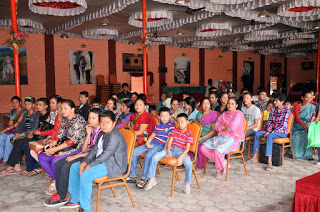 Mrs. Chaulagain gave a speech about her two sons with hemophilia, Pranit and Pratik. There was domestic violence,
Mrs. Chaulagain gave a speech about her two sons with hemophilia, Pranit and Pratik. There was domestic violence,Laxmi translated for me. Her husband used to beat her; how
dare she provide not one but two sons with a chronic disorder for which there was
no treatment! He eventually left. They lived in poor conditions, and she
struggled to raise two boys. She thanks Save One Life and said she benefited
from the program and to keep it going a long time!
One father stood
and said, Our government won’t give treatment to us! He said all
the hemophilia families are happy with Save One Life. They use the money for
school fees.
and said, Our government won’t give treatment to us! He said all
the hemophilia families are happy with Save One Life. They use the money for
school fees.
Mina has a son
with factor VIII deficiency; she is very happy with the support from SOL. Her
husband lives in another country, trying to earn money to send to them. So this
really helps her.
with factor VIII deficiency; she is very happy with the support from SOL. Her
husband lives in another country, trying to earn money to send to them. So this
really helps her.
Then Nawraj, a
young man, 18, spoke: he said it was difficult to have
hemophilia during exam time (which is much more stressful in these countries
than in the US). He thank us for Save One Life. He described his
pain, bleeding at night, and sometimes felt it was better not to have been born
than to be born with hemophilia. He lost a job due to so many bleeds. “Our
government has not recognized us,” he lamented, “because outwardly we look normal, so they
don’t pay us attention.” His speech was so impassioned about suffering. “You’ve been saving us,” he said. “It’s
because of you. I want to say more, but I cannot express it, the level of pain
I felt.”
young man, 18, spoke: he said it was difficult to have
hemophilia during exam time (which is much more stressful in these countries
than in the US). He thank us for Save One Life. He described his
pain, bleeding at night, and sometimes felt it was better not to have been born
than to be born with hemophilia. He lost a job due to so many bleeds. “Our
government has not recognized us,” he lamented, “because outwardly we look normal, so they
don’t pay us attention.” His speech was so impassioned about suffering. “You’ve been saving us,” he said. “It’s
because of you. I want to say more, but I cannot express it, the level of pain
I felt.”
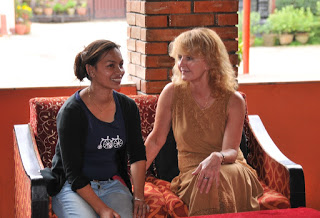 Then Nawraj sang
Then Nawraj sanga song that he composed. It was mournful, deep. Loosely translated, he sand, “I’m living alone, crying alone. Because of you, hemophilia…the pain is too much to bear! I’m sad, crying!”
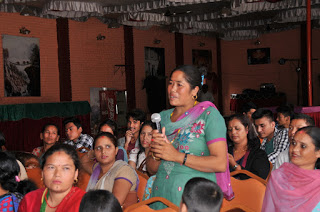 And remember, on top of all this, these families have suffered through a tremendous earthquake that destroyed many of their homes!
And remember, on top of all this, these families have suffered through a tremendous earthquake that destroyed many of their homes!
After all the
speeches came questions about hemophilia, which Ujol kindly answered. Then the ceremony:
we had gift bags for all the kids, courtesy of all the give-aways from NHF just
recently. Yes, I shamelessly confiscated about 50 bags from one homecare company, squeezy
toys for the kids veins from another.
speeches came questions about hemophilia, which Ujol kindly answered. Then the ceremony:
we had gift bags for all the kids, courtesy of all the give-aways from NHF just
recently. Yes, I shamelessly confiscated about 50 bags from one homecare company, squeezy
toys for the kids veins from another.
The kids loved their
gifts. The older ones got t-shirts with hemophilia slogans on them (another involuntary
gift from yet another homecare company!). And each child received their annual
funds from Save One Life, about $240. For some this is a lot of money.
gifts. The older ones got t-shirts with hemophilia slogans on them (another involuntary
gift from yet another homecare company!). And each child received their annual
funds from Save One Life, about $240. For some this is a lot of money.
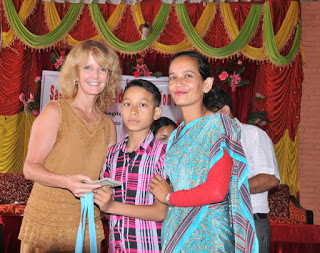 Then I gave a
Then I gave aspeech! I started by asking what the highest mountain in the world was. Of
course they knew; it’s right in their country! Sagarmatha, better known in the
West as Mt. Everest. And I shared the story of a young American man with
hemophilia (Chris Bombardier) who plans to climb that mountain. We talked about
what’s possible, even without factor, and what’s possible with factor. Dreams,
goals… and never give up. I asked many children, What’s your dream? We went around the room asking each child: Engineer,
musician, teacher… they all had dreams. I told them we want to help make their
dreams come true.
Lunchtime was a
buffet of delicious local food: rice and chicken. The children played with
their new toys, and soon, the families dispersed happily. I too went back to my
hotel, happy, moved. Dedicated to these fine families.
buffet of delicious local food: rice and chicken. The children played with
their new toys, and soon, the families dispersed happily. I too went back to my
hotel, happy, moved. Dedicated to these fine families.
Friday September 4, 2015
Today Laxmi
picked me up and we drove back to the NHS office, through the blackened air. The pollution in Kathmandu is deeply unhealthy; I often felt like I was hitched to an exhaust pipe. About 33% of the population wears surgical masks outside, and eventually I did too.
picked me up and we drove back to the NHS office, through the blackened air. The pollution in Kathmandu is deeply unhealthy; I often felt like I was hitched to an exhaust pipe. About 33% of the population wears surgical masks outside, and eventually I did too.
Inside the office was
a room full of wonderful, handsome young men, all ages 21-35. I was surprised
to see Deepak Neupane present; his eyes lit up when he saw me. I first met him
in 1999, when he was only 12 years old, and severely crippled. He became the
poster boy for WFH, and to this day they still use his image. He has
his hurts, is stoic, not overly friendly. But Deepak is married. It was a happy reunion and he says he
remembers me.
a room full of wonderful, handsome young men, all ages 21-35. I was surprised
to see Deepak Neupane present; his eyes lit up when he saw me. I first met him
in 1999, when he was only 12 years old, and severely crippled. He became the
poster boy for WFH, and to this day they still use his image. He has
his hurts, is stoic, not overly friendly. But Deepak is married. It was a happy reunion and he says he
remembers me.
One of the boys,
Raju, with a shock of dark hair, said, “Ma’am, I have to tell you this. You look like Barbie
doll!” The boys all laughed.
Raju, with a shock of dark hair, said, “Ma’am, I have to tell you this. You look like Barbie
doll!” The boys all laughed.
I furiously took
notes as they spoke, while Laxmi recorded their names and ages. At the end,
when they had finished, I told them my name (they all knew) and said, And I am not going to tell you my age! And the
laughed in return.
notes as they spoke, while Laxmi recorded their names and ages. At the end,
when they had finished, I told them my name (they all knew) and said, And I am not going to tell you my age! And the
laughed in return.
Durga Datta
Lamsal, age 27, a government employee, is the chair. He’s an impressive young man , soft spoken, a rising leader,
mature and responsible. I met Ashrit BK, who has an inhibitor, 26 years old. He received a scholarship from us but is not attending now due to
bleeds. His left hand appears to have Volkman’s contracture.
Lamsal, age 27, a government employee, is the chair. He’s an impressive young man , soft spoken, a rising leader,
mature and responsible. I met Ashrit BK, who has an inhibitor, 26 years old. He received a scholarship from us but is not attending now due to
bleeds. His left hand appears to have Volkman’s contracture.
John Bhuyel–who dared to sit in front of me with a NY
Yankees hat on–dreams to be a computer engineer and used my analogy from my speech about having dreams.
Yankees hat on–dreams to be a computer engineer and used my analogy from my speech about having dreams.
I
learned that the Youth
Committee members are elected with two-year terms. They organize a blood donation
camp twice a year. They are primarily social: sharing each other’s pain and what happens to each
other. They hold a Youth Camp annually, just the guys, usually for 5 days, and
they have lectures and do social things. This year they visited the mid-Western
region and had medics come lecture.
learned that the Youth
Committee members are elected with two-year terms. They organize a blood donation
camp twice a year. They are primarily social: sharing each other’s pain and what happens to each
other. They hold a Youth Camp annually, just the guys, usually for 5 days, and
they have lectures and do social things. This year they visited the mid-Western
region and had medics come lecture.
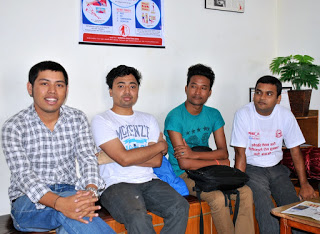
When I asked if they did physical therapy at home, the whole room groaned and
eyes rolled. Oh, I hit a nerve. I felt like the mother asking her sons if
they made their bed or did their homework. Yeah, they know what to do but often “forget” to do it. Boys are the same the world over!
One sensitive
subject was marriage. In Nepal, arranged marriages are still common. What prospect
does a young man have to marry, when he is poor and disabled? Jagatlal (“Monsoon”) is married but his was a love match.
They all agreed it was difficult; the girls often leave them when they see how
hard it is for them to have hemophilia. Krishna, a handsome young man with
large, soulful eyes, told me his girlfriend left him. It hurts a mother, all
mothers, to hear this about a young man.
subject was marriage. In Nepal, arranged marriages are still common. What prospect
does a young man have to marry, when he is poor and disabled? Jagatlal (“Monsoon”) is married but his was a love match.
They all agreed it was difficult; the girls often leave them when they see how
hard it is for them to have hemophilia. Krishna, a handsome young man with
large, soulful eyes, told me his girlfriend left him. It hurts a mother, all
mothers, to hear this about a young man.
To break the
increasingly somber mood, I brightly suggested a “Love Program” for the Youth
Group and they burst out laughing. How the Nepalese love to laugh!
Raju said Save One Life helped him a lot. They were all very grateful for our
help.
help.
At the end, we
shot some video of the boys telling their story of the earthquake, which was
emotional. Raju confided he was nervous (I think afraid of becoming too
emotional) and he talked on and on cathartically. His parents are
still living in a tent four months later.
shot some video of the boys telling their story of the earthquake, which was
emotional. Raju confided he was nervous (I think afraid of becoming too
emotional) and he talked on and on cathartically. His parents are
still living in a tent four months later.
I learned that
they were coming back from camp when the earthquake struck. On the bus, they were
frightened; they saw people crying, and weren’t sure at first why.
they were coming back from camp when the earthquake struck. On the bus, they were
frightened; they saw people crying, and weren’t sure at first why.
Then we did a
group shot, me and the boys. I gave them all my business cards, told
them they were the future leaders of the Society so learn leadership! And to be
mentors for the young ones, who need them. They presented me with a beautiful wall hanging of Buddha.
group shot, me and the boys. I gave them all my business cards, told
them they were the future leaders of the Society so learn leadership! And to be
mentors for the young ones, who need them. They presented me with a beautiful wall hanging of Buddha.
The NHS and I had a farewell dinner at 7:30 pm, and it was a relaxing end to the work week. By 9 pm I was tired; we exchanged the gifts, and
Beda walked me from the hotel down to the main street so I could get a taxi. He
is disabled, and yet never complains. He rode in the taxi with me, so I would be
safe. He is a man of few words, but confided, You inspire me. I admire all your
work for all the people with hemophilia around the world.
Beda walked me from the hotel down to the main street so I could get a taxi. He
is disabled, and yet never complains. He rode in the taxi with me, so I would be
safe. He is a man of few words, but confided, You inspire me. I admire all your
work for all the people with hemophilia around the world.
Coming from him,
it was one of the highest complements I had ever received.
it was one of the highest complements I had ever received.
Saturday September 5, 2015
I awoke at 4:15
am, after waking up off and on since 10:30 pm, but it was overall a good sleep.
I hurriedly dressed. I pride myself on being
punctual and responsible. I tiptoed to the lobby, awaking the poor guys on duty
who were flopped on the lobby couches. And waited in the lobby for my ride. One
of the young managers, tall, thin and bespeckled, asked who I was waiting for? When
I replied The Mountain Flights tour, he said the ride was coming at 5:45
am. I could have slept another whole hour!
am, after waking up off and on since 10:30 pm, but it was overall a good sleep.
I hurriedly dressed. I pride myself on being
punctual and responsible. I tiptoed to the lobby, awaking the poor guys on duty
who were flopped on the lobby couches. And waited in the lobby for my ride. One
of the young managers, tall, thin and bespeckled, asked who I was waiting for? When
I replied The Mountain Flights tour, he said the ride was coming at 5:45
am. I could have slept another whole hour!
I went back to
my room sheepishly, lay down and actually fell asleep at some point. At 5:30 am,
back in the lobby, and the ride appeared. The trip to the airport was fast, and
the wait was until 7:15. Finally they
called our flight– Buddha Air 101, and I was hurried to the crowded bus which
took us to our plane. I didn’t expect much from a quick chartered flight but
the plane was pristine. We each got a window seat. Soon
we were aloft, and as we pulled away from Kathmandu, I saw the gray, dirty air,
which left the surrounding hills only blue silhouettes, become clearer and
cleaner, and the land becoming green with rolling discernible hills, dotted
with colorful pillow-candy colored houses. We were finally aloft, 22,000 feet
and within 20 minutes the Himalaya were in view.
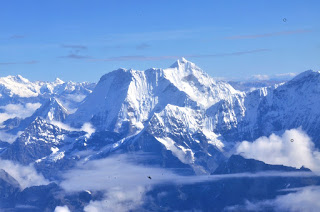 There are no
There are nowords to describe how you feel. Your heart leaps with awe, with love for these antediluvian
guardians of the world, formed in the violence of the birth of a planet. The
first jutted straight up above the clouds like a sentinel, far away, like a
warning to be careful of the approach of the others. They almost seemed to have
personalities. They were majestic, powerful, magnetic. Then there were more and
more. I felt like I
was gazing upon the Gates of Heaven.
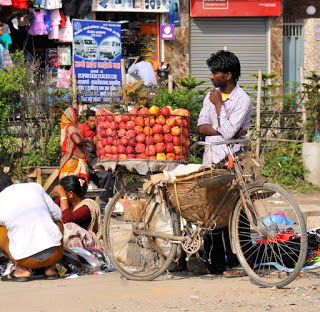 A silence fell on the
A silence fell on theplane as we stared at the snow giants. Soon, mighty Everest itself. Distant,
remote. I cannot imagine what it could take to climb it and felt the urge to go to base camp some day!
When the mountains all
came within distance it was too much to process. The sharp drops, the edges, the
crevices, the seracs. One after another and another. Oh, they are just rocks,
but what beauty! What
spells do they cast over us that suddenly make us want to be there, climb them even
though we know we would put our life at risk?
came within distance it was too much to process. The sharp drops, the edges, the
crevices, the seracs. One after another and another. Oh, they are just rocks,
but what beauty! What
spells do they cast over us that suddenly make us want to be there, climb them even
though we know we would put our life at risk?
All too soon we
had to return. That evening, I boarded Qatar Airways and left Nepal for the other side of the world.
See the full Gallery of photos of Nepal:
https://lakelley.smugmug.com/InternationalTravel/Save-One-Life/Nepal-2015/51907135_ww8cL6#!i=4344863638&k=3hmP65P
Great Book I Just Read
Savage Summit [Kindle]
Jennifer Jordan
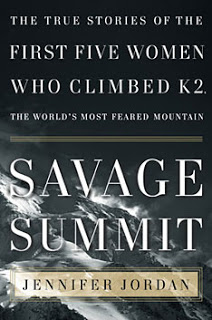 K2 remains the most dangerous mountain in the world, with a death rate of 25%. Until 1986, only men had summited the Savage Summit. In this book, Jordan chronicles the lives of five women who made mountaineering history: the ones who summited K2. Ninety women have scaled Everest; of the only six women who summited K2, three lost their lives on the way back down. I worried about this book being a glorification of women who climbed K2 (Alison Hargreaves was mother of two children under age 6 who died after summiting), as her sympathetic and rather feminist intro set the tone. But I was impressed that Jordan shifted into journalist mode and objectively examined the lives, loves, passions and mistakes of these unmistakably courageous, complex and yet sometimes myopic, women who were compelled to risk their lives… and often lost their lives in pursuit of a dream. Four/fives stars.
K2 remains the most dangerous mountain in the world, with a death rate of 25%. Until 1986, only men had summited the Savage Summit. In this book, Jordan chronicles the lives of five women who made mountaineering history: the ones who summited K2. Ninety women have scaled Everest; of the only six women who summited K2, three lost their lives on the way back down. I worried about this book being a glorification of women who climbed K2 (Alison Hargreaves was mother of two children under age 6 who died after summiting), as her sympathetic and rather feminist intro set the tone. But I was impressed that Jordan shifted into journalist mode and objectively examined the lives, loves, passions and mistakes of these unmistakably courageous, complex and yet sometimes myopic, women who were compelled to risk their lives… and often lost their lives in pursuit of a dream. Four/fives stars.

